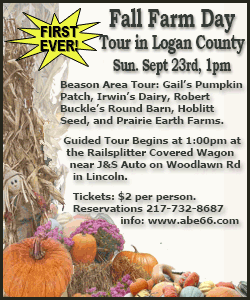|
 Allen began Growing Power Inc., a nonprofit organization in north Milwaukee, when he transformed a former garden center into an urban vegetable farm. He works with youth groups, schools, churches and anyone else interested in learning how community gardens can change people for the better. Allen began Growing Power Inc., a nonprofit organization in north Milwaukee, when he transformed a former garden center into an urban vegetable farm. He works with youth groups, schools, churches and anyone else interested in learning how community gardens can change people for the better.
Urban farming, he said, ultimately leads to a healthier community.
"It's all about the soil," he said of the high nutrient compost the organization makes. "If you grow soil, then you can grow healthy food."
Growing Power will host a national conference Wednesday through Saturday for beginning and small-scale farmers.
Allen, 58, said the event boosts Milwaukee as a "Mecca for food system work" and provides good news for a city that has sometimes been known for poverty, unemployment and crime.
The conference, titled "Risk Management Strategies for Beginning and Small Farmers and Ranchers," was arranged with the U.S. Department of Agriculture's Risk Management Agency.

Bill Buchanan, director of civil rights and community outreach for the RMA, said Allen's group was a natural choice for the event.
"Not only is Will very well-known nationwide and internationally, he creates a lot of innovative programs that can be done on small plots of land," he said. "And also he's willing to share his knowledge with anyone who wants it."
Allen was not surprised to see far more than the expected 400 people sign up for the conference. By late last week, he said about 700 had registered.

"The renaissance in urban agriculture is the hottest thing going right now," he said.
Allen's center is an example of this renaissance, with its greenhouses filled with the earthy smells of plants and herbs. It is a place where young people can work, learn and share his vision.
"You see kids who come in with this chip on their shoulder," said Deshell Parker, 28, who worked with Allen as an adolescent. "By the end of the program you see them proud of what they've put together and what they've grown."
Parker said her exposure to Allen helped her develop the commitment to go to college and earn advanced degrees as a social worker. Today, Parker's 5-year-old daughter is becoming an expert in recycling, vegetables and compost through her visits to the center, she said.
[to top of second column]
 |
 Allen grew up on his family's small vegetable farm outside Washington, D.C., and went on to play basketball at the University of Miami. He was drafted in 1971 to the Miami Floridians of the American Basketball Association as a 6-foot-6 forward. He played the next three years in Europe before returning to the U.S., where he got back into vegetable farming in the Milwaukee suburb of Oak Creek.
Allen purchased the former garden center in 1993 on a 2-acre plot and developed it into an example of the community-based farming he promotes.
Allen said the key to success is the compost he makes from waste food and other organic material, with the help of millions of earthworms that digest what otherwise would go to landfills.
"This year we'll rescue 6 million pounds of food residue and turn it into healthy soil," he said.
Among that residue is waste barley and hops from Lakefront Brewery LLC in Milwaukee.
Allen raises vegetables in thousands of pots, and his self-sustaining system of fish farming raises lake perch and tilapia while circulating the water to feed growing plants.
Behind his five greenhouses, there is also a small barnyard of chickens, ducks and goats.
Allen said that besides providing locally produced food products to consumers, the community garden conserves fuel.
"Everything that we're delivering to grocery stores, to restaurants, to schools, to all of our customers, guess where it would come from
-- it would come from California, thousands of miles away," he said.
___
On the Net:
Growing Power: http://www.growingpower.org/index.htm
[Associated Press; by James A.
Carlson]
Copyright 2007 The Associated Press. All rights reserved.
This material may not be published, broadcast, rewritten or
redistributed.

 |